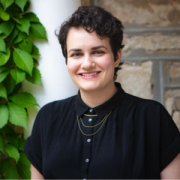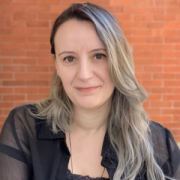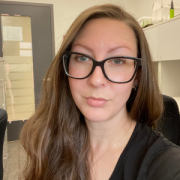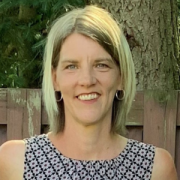CBS announces the winners of the 2023 Teaching and Mentorship Awards
The College of Biological Science is honouring five exceptional educators and mentors with the 2023 CBS Teaching and Mentorship Awards. The awards recognize those who’ve demonstrated outstanding leadership and commitment to student learning, wellbeing and success.
The winners of the 2023 CBS Teaching and Mentorship Awards are:
- CBS Faculty Teaching Excellence Award: Dr. Jim Uniacke, Molecular and Cellular Biology
- Graduate Mentoring Award: Dr. Rebecca Shapiro, Molecular and Cellular Biology
- Mentorship Award for Post-Doctoral Fellows: Dr. Begüm Alural, Molecular and Cellular Biology
- Graduate Teaching Assistant Award of Excellence: Hannah Brazeau, Integrative Biology
- Staff Teaching Award of Excellence: Amanda van der Vinne, Molecular and Cellular Biology
CBS Faculty Teaching Excellence Award
Dr. Jim Uniacke, Molecular and Cellular Biology
Nominated by Dr. Marc Coppolino

 Since Dr. Jim Uniacke joined the Department of Molecular and Cellular Biology in 2013, he has worked to improve students’ learning and educational experiences. He is a passionate and inspiring instructor in a variety of introductory and advanced MCB courses, a supportive mentor to both undergraduate and graduate students, and an advocate and leader in evidence-based teaching practices that have succeeded in raising students’ performance, engagement and satisfaction with course material.
Since Dr. Jim Uniacke joined the Department of Molecular and Cellular Biology in 2013, he has worked to improve students’ learning and educational experiences. He is a passionate and inspiring instructor in a variety of introductory and advanced MCB courses, a supportive mentor to both undergraduate and graduate students, and an advocate and leader in evidence-based teaching practices that have succeeded in raising students’ performance, engagement and satisfaction with course material.
Uniacke has joined and led several working groups and committees to improve and better align core MCB courses, several of which he also teaches. Basing his decisions on current teaching and learning research, consultations with colleagues and student surveys, he redesigned introductory courses to focus less on memorization and more on participation and transferrable skill development, such as critical thinking. He has also incorporated inclusive teaching practices, such as more low-stakes assessments in place of heavily weighted exams.
His students describe him as passionate and enthusiastic, inspiring them to dig deeper into content they might not otherwise, and clear and effective, helping them grasp challenging concepts more easily. He has shown unflagging dedication and care to his students, always putting their success and wellbeing first.
Graduate Mentoring Award
Dr. Rebecca Shapiro, Molecular and Cellular Biology
Nominated by Lauren Wensing
 Since she opened her lab in 2018, Dr. Rebecca Shapiro from Molecular and Cellular Biology has directly mentored 25 students, with many undergraduates staying on to complete PhDs after positive experiences under her supervision.
Since she opened her lab in 2018, Dr. Rebecca Shapiro from Molecular and Cellular Biology has directly mentored 25 students, with many undergraduates staying on to complete PhDs after positive experiences under her supervision.
Shapiro has built a reputation for her dedication to her graduate students, working closely with each to understand their goals and priorities and continuously seeking opportunities for them, including scholarship and grants, collaborations with other researchers and networking opportunities. Students are encouraged to develop their professional skills through participation in conferences, seminars and workshops, and to join committees, boards and outreach programs.
With equity, diversity and inclusion as core values in the Shapiro lab, her students describe a welcoming, inclusive environment where everyone is supported.
“Dr. Shapiro is a brilliant PI and it is a pleasure to learn by her side,” wrote Laetitia Maroc, a postdoctoral fellow in Shapiro’s lab, in her letter of support. “For us future generations of researchers, it is important to learn how to conduct science and to manage a lab, but it is also essential to learn these skills while being able of providing a safe and inclusive work environment, which is exactly what Dr. Shapiro is doing.”
Mentorship Award for Post-Doctoral Fellows
Dr. Begüm Alural, Molecular and Cellular Biology
Nominated by Dr. Jasmin Lalonde and Dr. Nina Jones
 Dr. Begüm Alural is a postdoctoral fellow in the Department of Molecular and Cellular Biology in the labs of Dr. Jasmin Lalonde and Dr. Nina Jones. She joined the university in 2019 and has since been awarded a prestigious CIHR Postdoctoral Fellowship, one of a select few on campus and in the department’s history.
Dr. Begüm Alural is a postdoctoral fellow in the Department of Molecular and Cellular Biology in the labs of Dr. Jasmin Lalonde and Dr. Nina Jones. She joined the university in 2019 and has since been awarded a prestigious CIHR Postdoctoral Fellowship, one of a select few on campus and in the department’s history.
Alural has provided mentorship and support to nine students in both labs, and guidance to many more undergraduate students in their fourth-year research projects and internships. Though many undergraduates lacked in-person lab experiences because of online learning during the pandemic, Alural was a go-to resource for students, making herself available to review lab fundamentals, answer questions, troubleshoot problems and offer guidance, insights and encouragement. She is known in the labs for her passion for learning and science and her willingness to go the extra mile.
“From the basics of cell culture, to painstakingly troubleshooting tricky western blots, Begüm took her time, teaching step by step so we were confident in our understanding of the technique moving forward,” wrote master’s student Cassandra Clausen and undergraduate Hyeyun Yang in their letter of support. “She finds the perfect balance between guiding students by working by their side, and trusting them to work independently, that fosters a confidence that is unmatched by anyone we have ever worked with.”
Graduate Teaching Assistant Award of Excellence
Hannah Brazeau, Integrative Biology
Nominated by Dr. Christina Caruso
 As a teaching assistant for several biology and statistics courses, Hannah Brazeau, a PhD student in Integrative Biology, has consistently gone above and beyond to support and encourage student learning.
As a teaching assistant for several biology and statistics courses, Hannah Brazeau, a PhD student in Integrative Biology, has consistently gone above and beyond to support and encourage student learning.
For her seminar in a second-year statistics course, she transformed the teaching material provided to her, highlighting common mistakes students had made on previous assignments, reviewing difficult concepts, and offering tips for success on assignments. She then shared her redesigned PowerPoint slides with the other TAs in the course, to help them, as well as their students, get the most out of their experience.
In a second-year ecology course, Brazeau stepped beyond her role again as teaching assistant when the class was suddenly left without an instructor. She began taking on many of the duties of the course coordinator, who, in turn, began lecturing the course. Brazeau responded to requests and questions, from both students and other TAs, organized and led meetings, helped manage Courselink, the online textbook and associated assignments, sent communications to the class, prepared teaching materials for weekly seminars, streamlined grading and recordkeeping, and put together study guides for students.
“Hannah’s commitment to teaching and mentorship was evident in her interactions with students and the rest of the teaching team,” wrote Belinda Ward-Campbell, a teaching support instructor for BIOL 2060, in her letter of support. “She was approachable, responsive, and always willing to help students understand the material presented during seminars and in class. Her enthusiasm and passion for teaching were infectious and her positive attitude created an atmosphere conducive to collegial work amongst the teaching team.”
Staff Teaching Award of Excellence
Amanda van der Vinne, Molecular and Cellular Biology
Nominated by Dr. Emma Allen-Vercoe
 In her 17 years as part of the teaching staff team in the Department of Molecular and Cellular Biology, undergraduate teaching coordinator Amanda van der Vinne has built a reputation for the exceptional experiential learning experiences she’s helped provide for students.
In her 17 years as part of the teaching staff team in the Department of Molecular and Cellular Biology, undergraduate teaching coordinator Amanda van der Vinne has built a reputation for the exceptional experiential learning experiences she’s helped provide for students.
Day to day, she manages the operations for the undergraduate labs and supports students, challenging them to think critically about their projects and consider new approaches, and ensuring their projects succeed.
She has also taught, coordinated, and helped redesign courses within the department, including third-year Advanced Methods in Microbiology. Working closely with Dr. Emma Allen-Vercoe, they reimagined the curriculum, providing students with more opportunities to learn hands-on research, analysis, communication and project development skills. They incorporated the Tiny Earth Antibiotic Discovery Platform, which challenges students to find antimicrobials in soil samples sourced from across Canada. The course was first taught online by van der Vinne and Allen-Vercoe, before van der Vinne taught it alone as coordinator/sessional the following year, in a hybrid model, while Allen-Vercoe was on sabbatical. After this year's successful fully in-person offering, and after proving herself able to handle the entire course alone, van der Vinne will take on the whole course again next year as coordinator/sessional.
“These students are planning, executing, and analyzing real science, while learning to communicate their findings along the way,” wrote fellow teaching coordinator Catrien Bouwman in her letter of support. “Amanda’s dedication to student learning is outstanding; she continuously updates and revises assignments and rubrics, meets with students to provide guidance and support, and mentors her TAs so they in turn can excel in their teaching roles.”